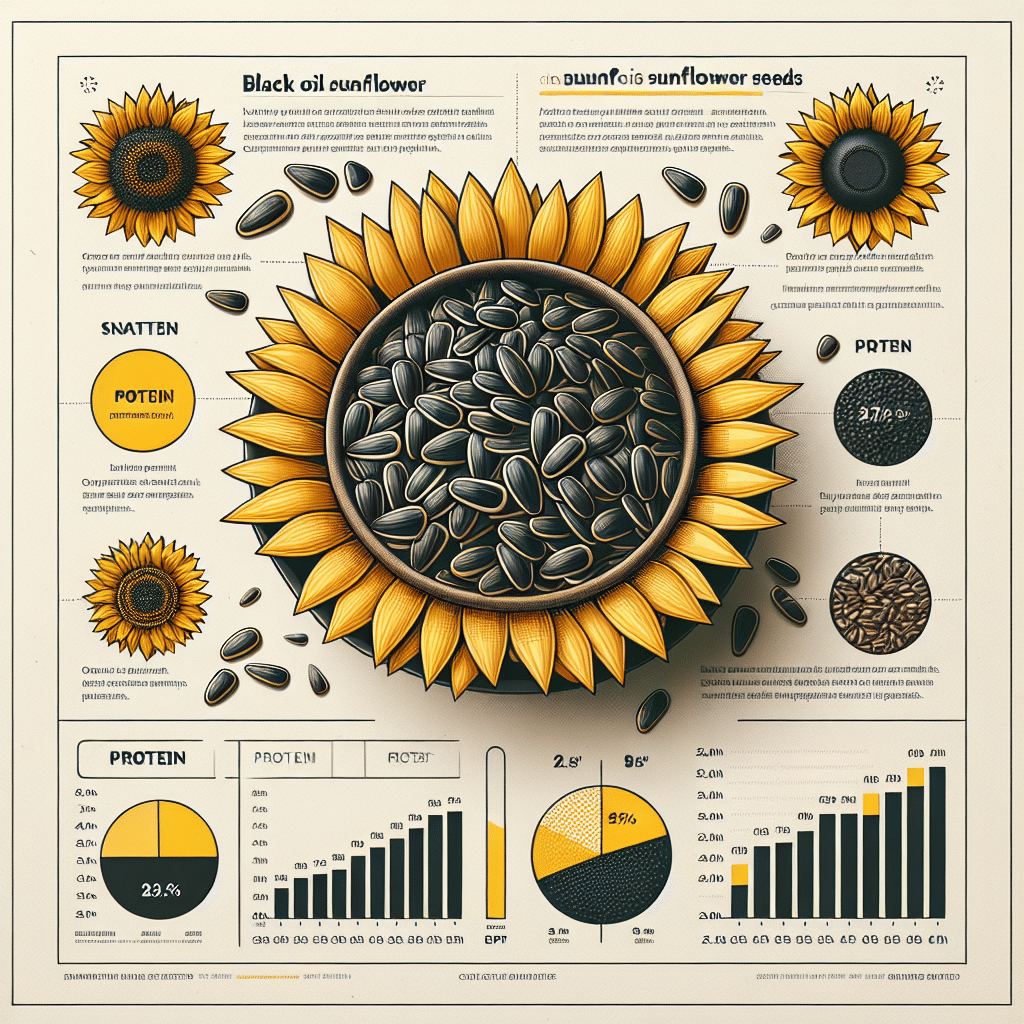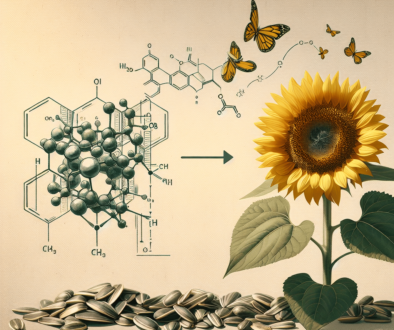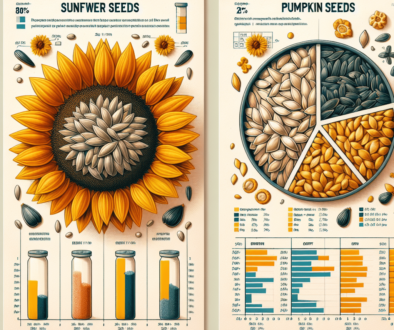Black Oil Sunflower Seeds: Protein Content Revealed
-
Table of Contents
- Black Oil Sunflower Seeds: Unveiling the Protein Content
- Understanding Black Oil Sunflower Seeds
- Nutritional Profile of Black Oil Sunflower Seeds
- The Protein Content Revealed
- Benefits of Sunflower Seed Protein
- Comparing Protein Sources
- Incorporating Sunflower Seeds into Your Diet
- Case Studies and Research
- Conclusion: The Power of Sunflower Seed Protein
- Discover ETprotein’s Plant-Based Protein Products
Black Oil Sunflower Seeds: Unveiling the Protein Content

Black oil sunflower seeds are a popular snack and a staple in bird feeders across the globe. But beyond their appeal to wildlife and casual nibblers, these seeds are a nutritional powerhouse, particularly when it comes to their protein content. In this comprehensive article, we will delve into the protein-rich world of black oil sunflower seeds, exploring their nutritional profile, benefits, and how they compare to other protein sources.
Understanding Black Oil Sunflower Seeds
Before we dive into the specifics of protein content, let’s understand what black oil sunflower seeds are. These are the seeds from the common sunflower plant, Helianthus annuus. The “black oil” descriptor comes from their thin shells and high oil content, which is particularly beneficial for birds during the winter months. However, this oil content also contributes to the seeds’ nutritional value for humans.
Nutritional Profile of Black Oil Sunflower Seeds
Black oil sunflower seeds are not only rich in protein but also contain a variety of other essential nutrients. Here’s a breakdown of their nutritional content per 100 grams:
- Protein: Approximately 20-25 grams
- Fats: Predominantly unsaturated fats, including linoleic acid (an omega-6 fatty acid)
- Fiber: 8-10 grams
- Vitamins: High in Vitamin E and B vitamins, including folate
- Minerals: Rich in magnesium, selenium, and zinc
It’s clear that black oil sunflower seeds are a nutrient-dense food, making them an excellent addition to a balanced diet.
The Protein Content Revealed
Protein is a crucial macronutrient necessary for building and repairing tissues, producing enzymes and hormones, and supporting overall health. Black oil sunflower seeds are an excellent source of plant-based protein. With roughly 20-25 grams of protein per 100 grams, they offer a substantial amount of this essential nutrient.
But what makes the protein in black oil sunflower seeds stand out? It’s not just the quantity but also the quality. These seeds contain a good balance of essential amino acids, which are the building blocks of protein that the body cannot produce on its own. This makes them a valuable protein source, especially for vegetarians and vegans who may need to pay extra attention to their protein intake.
Benefits of Sunflower Seed Protein
Incorporating black oil sunflower seeds into your diet can have several health benefits:
- Supports Muscle Health: The high-quality protein helps in muscle repair and growth, making it beneficial for athletes and those with active lifestyles.
- Enhances Satiety: Protein-rich foods like sunflower seeds can help you feel full longer, aiding in weight management.
- Boosts Heart Health: The unsaturated fats in sunflower seeds can contribute to lower cholesterol levels and a reduced risk of heart disease.
- Improves Skin Health: Vitamin E, an antioxidant found in sunflower seeds, protects the skin from oxidative damage.
With these benefits, it’s clear that black oil sunflower seeds are more than just a snack; they’re a functional food that can contribute to overall well-being.
Comparing Protein Sources
How do black oil sunflower seeds stack up against other protein sources? Let’s compare them to some common animal and plant-based proteins:
- Chicken Breast: A staple in high-protein diets, chicken breast contains about 31 grams of protein per 100 grams.
- Almonds: Another popular seed, almonds have about 21 grams of protein per 100 grams.
- Lentils: A go-to protein source for many vegetarians, lentils offer about 9 grams of protein per 100 grams when cooked.
While animal proteins generally have a higher protein content, black oil sunflower seeds hold their own as a plant-based option, offering a comparable amount to almonds and more than double that of lentils.
Incorporating Sunflower Seeds into Your Diet
There are many ways to enjoy black oil sunflower seeds and reap their protein benefits:
- Add them to salads for a crunchy texture.
- Blend them into smoothies for a protein boost.
- Use sunflower seed butter as a spread on toast or in recipes.
- Incorporate them into homemade granola or energy bars.
With their versatility and nutritional value, black oil sunflower seeds are an easy addition to any meal or snack.
Case Studies and Research
Several studies have highlighted the benefits of sunflower seed protein. For instance, research has shown that substituting animal protein with plant-based options like sunflower seeds can reduce the risk of chronic diseases such as heart disease and type 2 diabetes. Additionally, the high fiber content in these seeds has been linked to improved digestive health and a lower risk of obesity.
It’s important to note that while black oil sunflower seeds are a healthy choice, moderation is key due to their high-calorie content from fats. Balancing your intake with other protein sources and maintaining an overall healthy diet is essential.
Conclusion: The Power of Sunflower Seed Protein
In conclusion, black oil sunflower seeds are a valuable source of high-quality plant-based protein. They offer numerous health benefits, from supporting muscle health to enhancing heart health. By incorporating these seeds into your diet, you can enjoy their nutritional advantages while contributing to a more diverse and sustainable food system.
Discover ETprotein’s Plant-Based Protein Products
If you’re looking to diversify your protein sources further, consider exploring ETprotein’s range of plant-based protein products. They offer a variety of options, including organic rice protein, pea protein, pumpkin seed protein, and sunflower seed protein. These products are non-GMO, allergen-free, and characterized by a neutral taste, making them suitable for various applications in the food and beverage industry.
ETprotein’s commitment to quality and sustainability makes them a trusted supplier for consumers seeking plant-based protein options. Whether you’re formulating a new product or simply looking to enhance your diet, ETprotein has the solutions to meet your protein needs.
About ETprotein:
ETprotein, a reputable protein Chinese factory manufacturer and supplier, is renowned for producing, stocking, exporting, and delivering the highest quality organic bulk vegan protein and plant proteins. They include Organic rice protein, clear rice protein, pea protein, clear pea protein, pumpkin seed protein, sunflower seed protein, mung bean protein, etc. Their offerings, characterized by a neutral taste, non-GMO, allergen-free attributes, cater to a diverse range of industries. They serve nutraceutical, pharmaceutical, cosmeceutical, veterinary, as well as food and beverage finished product distributors, traders, and manufacturers across Europe, USA, Canada, Australia, Thailand, Japan, Korea, Brazil, and Chile, among others.
ETprotein specialization includes exporting and delivering tailor-made protein powder and finished nutritional supplements. Their extensive product range covers sectors like Food and Beverage, Sports Nutrition, Weight Management, Dietary Supplements, Health and Wellness Products, and Infant Formula, ensuring comprehensive solutions to meet all your protein needs.
As a trusted company by leading global food and beverage brands and Fortune 500 companies, ETprotein reinforces China’s reputation in the global arena. For more information or to sample their products, please contact them and email sales(at)ETprotein.com today.












